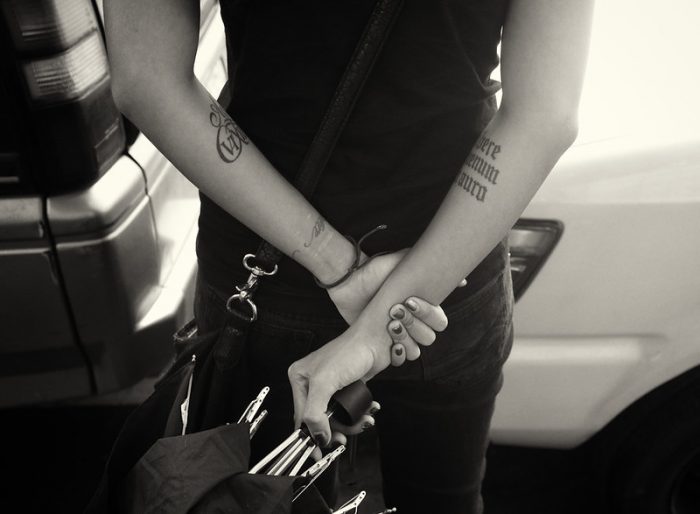
I wouldn’t have known I had these characteristics if I hadn’t read them aloud.
These characteristics form the laundry list traits that they use in ACOA (Adult Children of Alcoholics).
I knew that I was afraid of loud people. I had fear around any boss at work and would find myself in tears at any type of reprimand as a teenager. I knew I was in a constant state of fight or flight and numbed my overactive nervous system in various ways.
I definitely did not like it when I was criticized and took it as a personal attack. I had tantrums and threw things and ran away during conflicts. I hadn’t learned to say, I’m sorry, or own up to any personal responsibility. I got angry a lot and deflected. I blamed my childhood and what had been done to me, and I carried resentment for the way I was.
I didn’t know there was a way out. Hopefully, these traits will shed light on any trauma we have carried with us from growing up in a dysfunctional or alcoholic home—there doesn’t have to be alcohol involved for a home to be considered dysfunctional. Sometimes we try to deny it and say to ourselves, “Oh, it wasn’t that bad.”
I had a therapist many years ago tell me that sometimes it’s worse for the people where it looks perfect on the outside and is complete chaos on the inside. Mine was the opposite—it was disastrous from the outside and on the inside—but for me, at least, there was no facade going on. Just a feeling of shame and constant embarrassment of my alcoholic and drug-addicted parental figures.
I’ve learned some along the way of recovery, though, and I hope this helps anyone on the fence about seeking help for their past.
Trauma shows up in mysterious ways, and the first step is admitting the truth to yourself. Yes, it really was as bad as I remember. I’m not going to sugarcoat it or wish it away. The truth will set you free.
Talking about it takes the chains away. Sharing about it makes it less powerful. Overcoming an abusive, neglectful childhood is possible. I am here to bring some hope to what can feel like a dire situation. Breaking the cycle of childhood abuse and dysfunction can be done. It just takes a desire to do something different than was done to you.
The Laundry List—14 Traits of an Adult Child of an Alcoholic:
1. We became isolated and afraid of people and authority figures.
2. We became approval seekers and lost our identity in the process.
3. We are frightened by angry people and any personal criticism.
4. We become alcoholics, marry them, or both, or find another compulsive personality such as a workaholic to fulfill our sick abandonment needs.
5. We live life from the viewpoint of victims and we are attracted by that weakness in our love and friendship relationships.
6. We have an overdeveloped sense of responsibility and it is easier for us to be concerned with others rather than ourselves; this enables us not to look too closely at our own faults.
7. We feel guilty when we stand up for ourselves instead of giving in to others.
8. We became addicted to excitement.
9. We confuse love and pity, and tend to “love” people we can “pity” and “rescue.”
10. We have “stuffed” our feelings from our traumatic childhoods and have lost the ability to feel or express our feelings because it hurts so much (denial).
11. We judge ourselves harshly and have an extremely low sense of self-esteem.
12. We are dependent personalities who are terrified of abandonment and will do anything to hold on to a relationship in order not to experience painful abandonment feelings, which we received from living with sick people who were never there emotionally for us.
13. Alcoholism is a family disease—and we became para-alcoholics and took on the characteristics of that disease even though we did not pick up the drink.
14. Para-alcoholics are reactors rather than actors.
Tony A., 1978
The Flip Side of The Laundry List:
1. We move out of isolation and are not unrealistically afraid of other people, even authority figures.
2. We do not depend on others to tell us who we are.
3. We are not automatically frightened by angry people and no longer regard personal criticism as a threat.
4. We do not have a compulsive need to recreate abandonment.
5. We stop living life from the standpoint of victims and are not attracted by this trait in our important relationships.
6. We do not use enabling as a way to avoid looking at our own shortcomings.
7. We do not feel guilty when we stand up for ourselves.
8. We avoid emotional intoxication and choose workable relationships instead of constant upset.
9. We are able to distinguish love from pity, and do not think “rescuing” people we “pity” is an act of love.
10. We come out of denial about our traumatic childhoods and regain the ability to feel and express our emotions.
11. We stop judging and condemning ourselves and discover a sense of self-worth.
12. We grow in independence and are no longer terrified of abandonment. We have interdependent relationships with healthy people, not dependent relationships with people who are emotionally unavailable.
13. The characteristics of alcoholism and para-alcoholism we have internalized are identified, acknowledged, and removed.
14. We are actors, not reactors.
The Promises:
>> We will discover our real identities by loving and accepting ourselves.
>> Our self-esteem will increase as we give ourselves approval on a daily basis.
>> Fear of authority figures and the need to “people-please” will leave us.
>> Our ability to share intimacy will grow inside us.
>> As we face our abandonment issues, we will be attracted by strengths and become more tolerant of weaknesses.
>> We will enjoy feeling stable, peaceful, and financially secure.
>> We will learn how to play and have fun in our lives.
>> We will choose to love people who can love and be responsible for themselves.
>> Healthy boundaries and limits will become easier for us to set.
>> Fears of failure and success will leave us, as we intuitively make healthier choices.
>> With help from our ACA support group, we will slowly release our dysfunctional behaviors.
>> Gradually, with our Higher Power’s help, we will learn to expect the best and get it.
I truly believe these promises can come true. I have felt some come to fruition in my own life.
Seeking guidance and realizing we are not alone can be lasting steps to peace and fulfillment. Soon we will start seeking out healthy relationships and commitments, and leave the darkness behind us. One step at a time.
~

This account does not have permission to comment on Elephant Journal.
Contact support with questions.